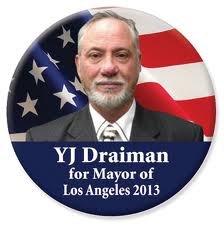YJ Draiman
Candidate for Mayor of Los Angeles
I’m not a politician. You won’t get politically correct doublespeak from me, just the plain facts. The plain facts are often disturbing and as a NC Board Member I’ve never been shy from revealing the sometimes ugly truth about the way the City functions.
Career politicians like the current have no interest in serving the public; rather, they use public office to serve their own interests and those of the small but wealthy cadre of greedy “special interests” who fund their campaigns in return for favors when decisions over controversial matters such as billboards and development have to be made by elected officials.
All too often, the City Council’s actions support the special interests at the expense of the interests of the ordinary people like you and me.
When common sense dictates that our already over-congested streets should not be further burdened by more high-density luxury condominium developments, current elected official’s side with the developers and contractors who funnel campaign contributions to further their interests. We need a Los Angeles
My pledge is for a “City of Los Angeles
Draiman for Mayor of Los Angeles 2013










